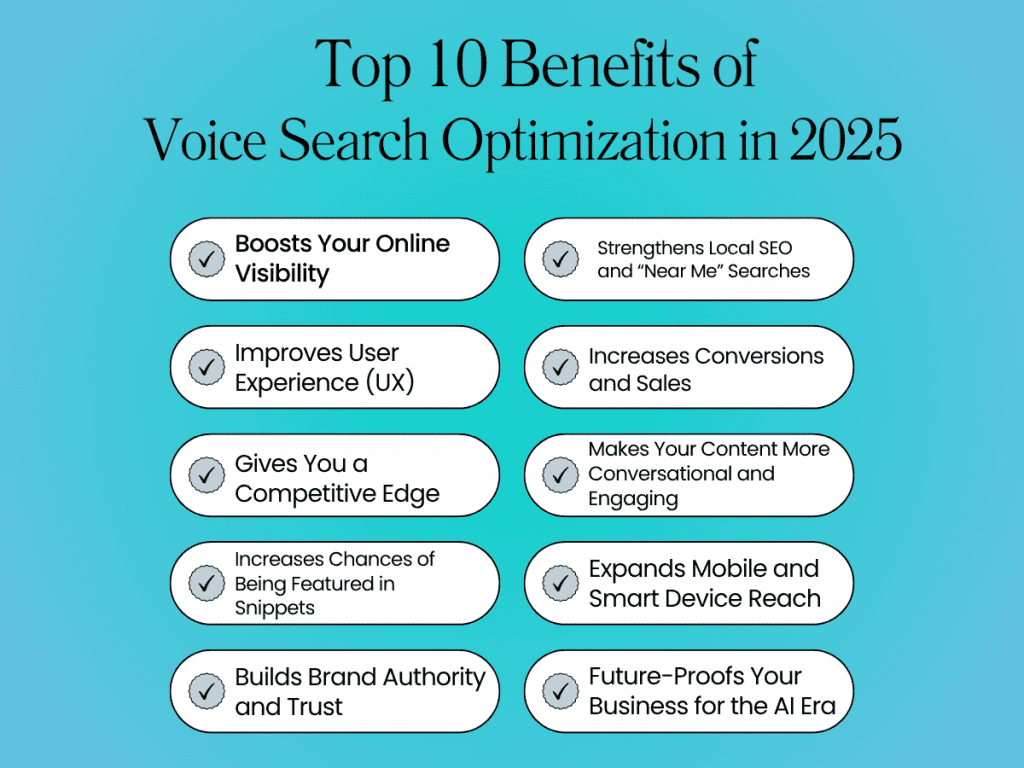The way people search online has drastically changed over the last few years. Instead of typing long queries, users are now simply asking their smart devices questions: “Where’s the nearest coffee shop?” or “What’s the best marketing agency near me?”
This shift marks the Voice Revolution of 2025, where speaking has become the new typing, faster, easier, and more natural. And for businesses, this means an enormous opportunity to reach customers in a whole new way.
In this blog, we’ll explore the top 10 benefits of voice search optimization for businesses in 2025, why it’s more important than ever, and how it can help you stay ahead in the evolving digital landscape.
The Voice Revolution in 2025
Voice search is no longer just an emerging trend; it has become a key part of how people interact with technology today. With the rise of smart assistants like Alexa, Siri, and Google Assistant, more users are turning to voice commands to find information quickly and conveniently.
Recent research shows that more than half of all online searches are now voice-based, and this number continues to grow each year. Whether people are shopping online, asking for directions, or reading reviews, many prefer speaking to their devices instead of typing.
This shift in behavior means that businesses must update their SEO strategies to align with the conversational nature of voice search. That’s where voice search optimization services play an important role. These services help brands create content that sounds natural, flows smoothly, and is easily recognized by voice assistants.
If you’re curious about how to optimize for voice search, the process begins with understanding user intent, writing in a conversational tone, and using AI-powered voice search tools to analyze performance and fine-tune results. This combination helps ensure your business stays relevant and visible in an increasingly voice-driven world.
Top 10 Benefits of Voice Search Optimization in 2025

Boosts Your Online Visibility
Voice search plays a major role in helping businesses stand out online. Since voice assistants like Alexa, Siri, and Google Assistant usually provide just one or two spoken answers instead of a full list of results, ranking for voice queries can instantly increase your brand’s visibility. This means more people can discover your business when they ask questions related to your products or services, leading to better traffic and brand recognition.
- Voice-optimized content helps your website appear in the top voice results.
- Higher visibility leads to more organic traffic and engagement.
- Local businesses, like a bakery optimized for “best bakery near me,” can attract instant customers through smart devices.
Strengthens Local SEO and “Near Me” Searches
Voice search is closely linked with local SEO because many spoken queries are location-focused, like “coffee shops near me” or “electricians open now.” When businesses enhance their Google Business Profile, use local keywords, and maintain consistent online listings, they’re more likely to appear in local voice results. Companies that invest in this strategy often see a noticeable increase in calls, visits, and local traffic due to improved voice discoverability. Research indicates that optimizing for voice search with conversational keywords and local-SEO focus significantly boosts visibility and discoverability.
Improves User Experience (UX)
Voice search enhances user experience by making online interactions faster and more convenient. People can ask questions and get instant answers while multitasking, which saves time and effort. When your website is optimized for voice queries, the content becomes more natural and conversational, aligning with how real people speak. This not only makes your site easier to navigate but also encourages visitors to stay longer, improving engagement and overall SEO performance.
Increases Conversions and Sales
Voice search often attracts users who are ready to take the next step, whether it’s making a purchase, booking an appointment, or visiting a store. These are high-intent users looking for quick solutions, and optimizing your content for their queries helps you reach them at the perfect time.
- Voice queries like “buy running shoes online” or “book a haircut near me” signal immediate intent.
- Businesses using AI voice search optimization tools can identify high-converting phrases more effectively.
- Voice-enabled shopping continues to grow, giving early adopters a clear edge in sales and customer engagement.
Gives You a Competitive Edge
In 2025, many businesses are still behind on voice search optimization, which gives proactive brands a strong advantage. By integrating conversational keywords, adopting AI-powered insights, and applying effective voice search optimization tips, you can outperform competitors who still rely on traditional SEO. Staying ahead in this evolving landscape ensures your business remains visible and relevant as more users embrace voice-based interactions.
Makes Your Content More Conversational and Engaging
Voice search mirrors how people naturally speak, making it essential for your content to sound authentic and relatable. Instead of short phrases like “best Italian restaurant NYC,” users now ask, “What’s the best Italian restaurant near me open right now?” Optimizing for these natural, long-form questions helps you connect more deeply with audiences and appear in valuable long-tail searches. In turn, this makes your website content more user-friendly, engaging, and favored by modern search algorithms that prioritize conversational flow.
Increases Chances of Being Featured in Snippets
Getting featured in Google’s snippets can make a big difference for your business, especially when it comes to voice search. These snippets are often the short answers that smart assistants read aloud when users ask a question. Structuring your content in a clear and conversational way makes it easier for search engines to select your site as the top result.
- Write simple, to-the-point answers that directly address common questions.
- Use bullet points and short paragraphs so information is easy to follow.
- Keep your tone natural and conversational.
- Add structured data to help search engines understand your content better.
When your content appears as a featured snippet, it becomes the voice that users hear first, putting your business in a powerful position to attract more attention.
Expands Mobile and Smart Device Reach
Voice search is no longer limited to phones, it’s everywhere. From smart speakers at home to voice assistants in cars, people are using voice commands throughout their day. When your business is optimized for voice search, it can show up no matter where users are searching. Whether someone is asking for directions, ordering food, or finding a nearby service, your brand can be the one that answers. This creates a consistent and seamless presence across multiple devices, helping you reach your audience anytime, anywhere.
Builds Brand Authority and Trust
Appearing as a top voice search result instantly makes your business sound more credible and trustworthy. People tend to rely on the answers given by their smart assistants because they view them as reliable sources. By using AI voice search optimization, you can identify the questions your customers ask most often and create valuable, easy-to-understand answers. Over time, this builds confidence in your brand and positions your business as an expert in your field.
Future-Proofs Your Business for the AI Era
Voice search is just the beginning of a much larger shift toward AI-powered search experiences. By optimizing now, your business can stay ahead of the curve as technology continues to advance. Using AI tools to refine your keyword strategy and create more conversational, human-friendly content prepares your brand for what’s next. Adapting early doesn’t just help you succeed today, it ensures your business remains competitive in the evolving digital landscape of the future.
Conclusion
Voice search is no longer just an emerging trend in SEO, it has become a major part of how people interact with technology today. More users are choosing to speak rather than type, and this shift is transforming how businesses need to approach online visibility.
The advantages of voice search optimization are clear. It helps improve your brand’s visibility, strengthens your local reach, increases conversions, and supports long-term business growth. Companies that invest in voice optimization now will be better prepared for the AI-driven search landscape ahead.
If you haven’t started optimizing yet, now is the perfect time. By using the right strategy, tools, and expert support, your business can connect with customers more naturally, stay ahead of competitors, and secure a strong position in the future of search.
FAQ’s
What are the advantages of voice search optimization?
Voice search optimization helps your business stand out in today’s fast-paced digital world. It improves your online visibility, strengthens local SEO, and connects you with users who rely on smart devices to find what they need. By making your content more conversational and easy for AI assistants to understand, you not only boost conversions but also create a smoother, more natural experience for your audience.
Why is voice search preferred over traditional search?
Many people now find it easier and faster to talk to their devices rather than type. Voice search allows users to get instant answers while driving, cooking, or doing other tasks. It’s hands-free, more convenient, and feels more natural, especially when using smartphones or smart speakers that can respond in real time.
Why is optimizing content for voice search crucial in digital marketing?
Optimizing for voice search prepares your business for the future of online marketing. As AI continues to shape how people find information, having voice-friendly content helps your brand appear in conversational queries. It strengthens your SEO strategy, builds trust, and keeps your business visible to users who rely on voice assistants to make quick decisions.
Curated by Lorphic
Digital intelligence. Clarity. Truth.




